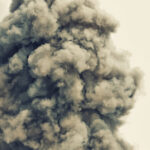
Here’s What Happens To Your Body If You Die In An Explosion
According to Live Science, the biggest accidental artificial explosion in history took place in the Canadian harbor of Halifax during World War I. A French ship loaded with TNT accidentally collided with a ship from Belgium, and the resultant detonation erupted with a force equal to three kilotons of TNT. 9,000 people were injured and around 2,000 were killed in the disaster. An area of around 1.25 miles around the site of the collision was devastated.
According to the Centers for Disease Control and Prevention, explosives can cause awful damage to the human body — a type that few medical professionals today have experienced. In their terrible ability to potentially harm many people at once, explosions are largely unlike any other force or weapon on Earth.
Injuries caused by explosions are known as blast injuries. Save The Children explains that they can be divided into four categories. Primary blast injuries result from the overpressure caused directly by the explosion itself and can devastate the organs of the body by causing internal expansion and contraction. The effects of the explosion on the surrounding environment can cause unique damage in the form of secondary blast injuries (flesh torn to pieces by shrapnel) or somebody being thrown into the air by the force of the explosion (tertiary blast injuries). The final form is referred to as a quaternary blast injury, which deals with harm dealt in the aftermath of the blast (such as dangerous fumes).
A variety of horrible ends
The Centers for Disease Control and Prevention reports that the lungs, gastrointestinal system, and inner ear are the parts of the body most frequently affected by primary blast injuries, as the gas within them is susceptible. The one that goes on to kill the most people, among those who survived the initial blast itself, is blast lung. Healthline explains that this occurs as a result of air entering veins in the lungs after the explosion damages the organs.
Naturally, the impact of an explosion on the body, and the cause of death resulting from it, will depend on a range of factors, such as the type of blast and a person’s distance from it.
Alison Tompkins, via RCEM Learning, explains that the ear is the organ most often affected by blasts and that loss of hearing and tinnitus can result. Beyond that, Tompkins adds, the immediate cause of death in an explosion could be anything from impalement to burning to crushing.

The Surprising Way Ellis Island Was Used During World War I And World War II

The Tragic Story Of Chinese General Yuan Shikai

What Really Happened To Founding Father Thomas Paine's Body?

Why Veterinarian David Adam Rapoport Killed His Mistress

The Biggest Mistakes People Make When Meeting The Pope

What Happens To Your Body When You Drink Liquid Nitrogen?

Forget The Stork: Mailmen Used To Deliver Babies As Packages

The Most Bizarre Toys From The Past Decade

What You Need To Know About China's Ancient Dog Breed

What's Really Inside A Lava Lamp?

























